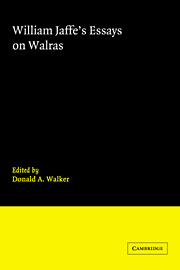Book contents
- Frontmatter
- Contents
- Preface
- Acknowledgments
- Introduction
- PART I WALRAS'S BIOGRAPHY
- PART II THE GENESIS AND DEVELOPMENT OF WALRAS'S IDEAS
- 3 A. N. Isnard, progenitor of the Walrasian general equilibrium model (1969)
- 4 The birth of Léon Walras's Eléments (1977)
- 5 A centenarian on a bicentenarian: Léon Walras's Eléments on Adam Smith's Wealth of Nations (1977)
- 6 Léon Walras and his relations with American economists (1960)
- PART III THE SCOPE OF WALRAS'S WORK
- PART IV SPECIAL TOPICS IN WALRAS'S ECONOMICS
- PART V WALRAS'S PLACE IN THE HISTORY OF ECONOMIC THOUGHT
- Index
4 - The birth of Léon Walras's Eléments (1977)
Published online by Cambridge University Press: 05 May 2010
- Frontmatter
- Contents
- Preface
- Acknowledgments
- Introduction
- PART I WALRAS'S BIOGRAPHY
- PART II THE GENESIS AND DEVELOPMENT OF WALRAS'S IDEAS
- 3 A. N. Isnard, progenitor of the Walrasian general equilibrium model (1969)
- 4 The birth of Léon Walras's Eléments (1977)
- 5 A centenarian on a bicentenarian: Léon Walras's Eléments on Adam Smith's Wealth of Nations (1977)
- 6 Léon Walras and his relations with American economists (1960)
- PART III THE SCOPE OF WALRAS'S WORK
- PART IV SPECIAL TOPICS IN WALRAS'S ECONOMICS
- PART V WALRAS'S PLACE IN THE HISTORY OF ECONOMIC THOUGHT
- Index
Summary
The publication dates 1874–77 of the first edition of Léon Walras's Eléments d'économie politique pure make this, its centenary, a fitting season of commemorating its birth. Whether one is inclined to applaud or to berate the memorialized book, its author must be credited with having earned the title of a “classical author,” at least in the sense that Alfred Marshall defined the term:
I do not myself hold a classical author to be one who more than others had said things which are true, as they stand. I don't feel bound to agree with him on many points, even on any point. But he is not for me classical unless either by the form or the matter of his words or deeds he has stated or indicated architectonic ideas in thought or sentiment, which are in some degree his own, and which, once created, can never die but are existing yeast ceaselessly working in the Cosmos.
If the advent of Walras's Eléments can lay claim to more than anecdotal interest, it is because it represented from its first appearance a theoretical innovation which, as time went on, imparted a new direction to economic thinking. It taught economists to discern in the hubbub of countless markets the semblance of a coherent pattern of interdependencies amenable to rational comprehension and rigorous analysis. To be sure, adumbrations of the same pattern had already appeared in earlier literature and were known to Walras.
- Type
- Chapter
- Information
- William Jaffe's Essays on Walras , pp. 78 - 92Publisher: Cambridge University PressPrint publication year: 1983
- 1
- Cited by



